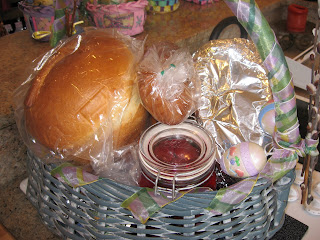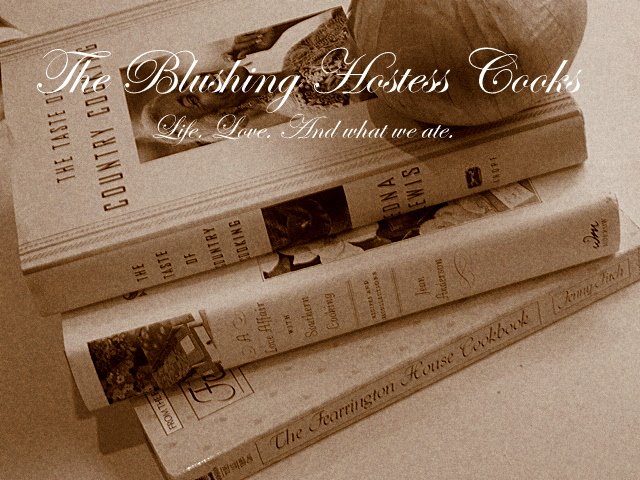
Here is a thought: How about getting up, everyday for a month, and baking thousands of loaves of Easter Breads from secret nearly-ancient recipes, slaving over these for hours each day, and not making a dime from it? How about creating thousands of little molded butter lambs in a church basement? Not for you?
Well, you are in luck. The Ladies of the Golden Dome, an organization belonging to our local Greek Orthodox church, willingly take up the task every year in Danbury, Connecticut. It is with reverence for their task, and for their bread, that I tell you something about us as a family, and about the Golden Dome Bakers...
I am not sure where our story begins, but let's call it in a land called Before, my Godmother's family, and now ours, follows a tradition handed down through her family. They gather all of the foods to be served at the Easter breakfast in their home, and I do mean all, and pack them into a large Easter basket. This basket is practically bursting with a feast we eat only once a year. It is filled with the Easter ham, smoked kielbasa, pickled eggs, hard-cooked eggs, pickled horseradish, scallions, butter, salt, Pasca bread, nut bread, poppy bread, sweet wine, and the butter lamb. It is meant to be blessed, and this blessed food is consumed at the Easter morning meal because it signifies the breaking of the fast. People from different parts of Eastern Europe have differing traditions, some bless their children's Easter baskets, other bless small portions of the Easter meals (Margaret has provided this website as an example). We bless it all. We usually win the unofficial biggest basket contest (which exists only in the minds of our people and is judged by our wandering eyes at the Blessing ritual), which occurs in a church locally whose congregation largely descends Eastern Europe.
That is what you need to know about me from hello: My Easter food is blessed. And if you are looking for me on Holy Saturday, you better look in a Ukraine parish, because I'm not at 121. And the week before, you can catch us picking up bread from the Golden Dome Bakers. You are welcome to join us not only because this involves the most important and reverent of Holy Days, Fasts, and Celebrations, but because this is a holiday tradition people of every walk could enjoy and share with children who will come to respect and consider another corner of the world each year while still remembering what we have to be thankful for. This year, our Easter family welcomes two new children into this tradition. They will learn to gather the basket, attend the blessing and the blessing lunch afterwards, and to slice carefully onto a dozen cherished plates and platters the bounty which recognizes sacrifice and history and unites millions of likely and unlikely people across the world.
This is our tradition, and as you know, sharing tradition is one of Blushing's goals and rules (Blushing Rule #7). You will need a very big basket and someone strapping to lug it about for you. Use this as a checklist (you will need to enlist the ladies of the Golden Dome or some like them as these breads are not an easy feat). I will leave it here so that in future years you can travel back, both to the list and the tradition. Your secondary goal is to have the biggest basket (Rule #8), which is an inarticulated but important part of this most marvelous tradition:
The Easter Blessing Basket
As noted at Margaret's, Hopewell Junction, New York
Pickled horseradish
Pickled eggs (in the style of beets)
Baked ham
Smoked kielbasa
Trimmed scallions
Kosher salt
Butter lamb
Nut bread
Poppy Seed bread
Pasca
Pacsa with golden raisins
Halupka (egg chesse)
Colored Easter eggs
Manachewitz wine
maybe a bit of the children's Easter candy
Your basket should be adorned with ribbons and pussy willow and an embroidered lace cloth. It should be beautiful as can be when presented for blessing and carefully maintained throughout the year, this is of course, the vessel that has been blessed and captures small but critical remembrances of a remarkable human sacrifice. Treat it reverentially, even if you are not regularly worshipping any religion, it is a matter of respect for another and for their blessed traditions.







No comments:
Post a Comment